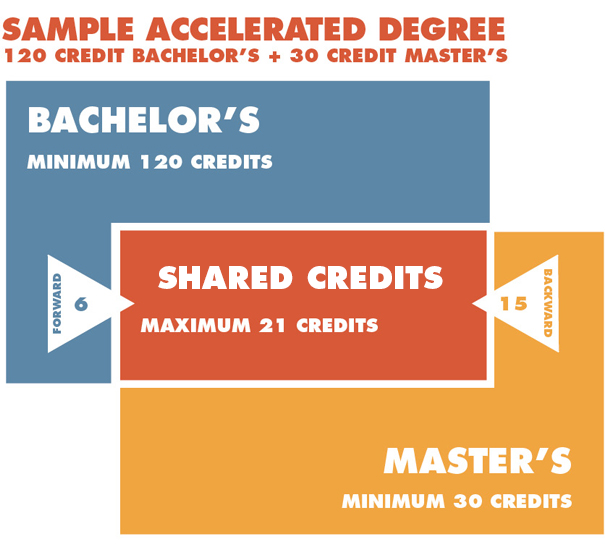Bright, highly motivated students with clear academic goals can capitalize on UWM’s prestigious designation as a top-tier “R1” research university. In accelerated graduate degrees, students can fast-track their graduate studies by starting their master’s or doctorate before completing their bachelor’s. Accelerated graduate degrees can save up to a full year of enrollment and tuition. Some students can graduate with both degrees in as few as five years. Accelerate your career at Milwaukee’s premier research university today!

Benefits
- Join gifted students in a rigorous curriculum
- Graduate with your master’s or doctorate degree up to a year earlier
- Save tuition by combining requirements
- Enjoy continuity of instruction with familiar teachers
- Launch your career sooner
- Earn more with a master’s degree
How It Works
Most programs require that students:
- Indicate their intention to pursue an accelerated graduate degree
- Meet minimum requirements, such as GPA and prerequisites
- Complete most general education requirements prior to graduate work
- Enroll in designated graduate courses that double count toward both the undergraduate and graduate degrees
- Apply early for Graduate School
- Complete required coursework to finish both undergraduate and graduate degrees
Each accelerated graduate degree pairs a single undergraduate degree with a single graduate degree.
Eligibility, shared credits, and application procedures differ. See individual accelerated graduate degree programs for details.
Accelerated Graduate Degree (AGD) Frequently Asked Questions
What are forward-shared credits and backward-shared credits in an accelerated graduate degree?
Both terms refer to the limited amount of course credits that can be shared between the bachelor’s and the graduate degree. This credit must be from courses identified and approved for the AGD in advance, as specified in the Catalog. Forward Shared Credit is earned by a student while still in their undergraduate career, and is used to fulfill bachelor’s requirements and, later, can also be used to fulfill graduate requirements. Backward Shared Credits are earned by a student in their graduate career and is used to fulfill graduate requirements as well as unfinished requirements from the bachelor’s degree.
All forward and backward shared credits must be completed at the G level. Students in U/G courses must be sure to enroll in the G-level section. All forward and backward shared credits must be used only to meet bachelor’s and graduate degree requirements as specified for the AGD.
In addition, forward double-counted credit must be earned with a grade of B or better (B- is not acceptable) and be taken within five years of admission to the master’s program.
How does an undergraduate student enroll in G-level sections to take graduate work for forward shared credit?
Department or program staff (schedule builders) or individual instructors provide permission for each undergraduate student to enroll in PAWS. To do this they provide student-specific permission in PAWS with the “Career Override” box checked. Students will not need a Registration Change Form when they have permission number. Student-specific permission instructions
Note that programs are responsible for monitoring AGD requirements for permitting undergraduates to take graduate-level courses eligible for forward shared credit. These include:
- Students must meet the minimum GPA requirements for Graduate School of 2.75 at time of enrollment, or any higher minimum GPA requirements that the program has specified.
- Students must have completed any pre-requisites for graduate level work specified by the undergraduate program.
- UG students enrolled in G-level courses are held to graduate academic standards
Do undergraduates in graduate-level courses pay undergraduate tuition?
Yes. Tuition is determined by the student’s career, not by the level of the course. As a result, students taking graduate-level courses while still in their undergraduate careers will normally remain eligible for any forms of financial aid they already receive. Once students start their graduate career, they may become ineligible for some forms of financial aid, such as Pell Grants.
What administrative responsibilities does the Undergraduate Advisor have?
Undergraduate advisors attach the subplan code to the standard plan code for their major in PAWS. This can happen at any point during undergraduate career. Some AGDs require it to happen sooner than others.
They also help track students intending to complete the AGD, advise appropriately, and communicate with the Grad Rep about who is in the pipeline.
What issues should undergraduate advisors monitor and address for students considering AGDs?
- What GERs, major, and school/college requirements must be completed during undergraduate career.
- What undergraduate requirements can be deferred until later and fulfilled through backward shared credits after the student starts the graduate degree.
- Whether a student has completed all required undergraduate credits minus those credits that can be backward shared credits from the graduate degree before starting Graduate School. For instance, in an AGD that permits 15 credits to be backward shared credits from the graduate degree, the student must have completed at least 105 undergraduate credits before starting their graduate career.
- Are there any other special requirements that a student must meet as an undergraduate to qualify for the AGD, such as a higher minimum GPA or specific pre-requisites.
Where can I find the requirements for each individual AGD?
Requirements for all AGDS are now stored in the UWM Catalog:
catalog.uwm.edu/opportunities-resources/accelerated-masters-degrees/#programstext
If I have questions about AGD requirements or procedures, who should I contact?
Start with undergraduate and graduate program representatives for the AGD in question, who should know both sides of the AGD best. If you still have questions, or if you have questions about the broader AGD policy requirements, contact Kate Negri, the Master’s Retention Specialist at the Graduate School at kmnegri@uwm.edu.